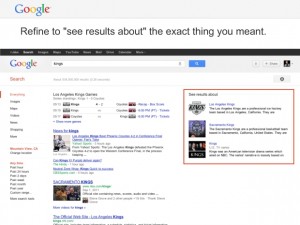 The vaunted Google search engine is set for an upgrade that will make it easier for users to find the information they need by putting their searches in context, the company said yesterday.
The vaunted Google search engine is set for an upgrade that will make it easier for users to find the information they need by putting their searches in context, the company said yesterday.
Over the next few days, users should begin to see an extra column appear on their Google search results pages. The new column, dubbed Knowledge Graph, is designed so that the engine can dig deeper to fulfill search requests by asking users to be more specific about what they’re searching for.
For example, if a user searches for the word “patriots,” the new feature will ask if they are interested in information about the New England Patriots football team, participants in the American Revolution or the Patriots Theater in New Jersey.
Once the user lists a specific subject, the irrelevant results disappear.
“This is a critical first step towards building the next generation of search, which taps into the collective intelligence of the Web and understands the world a bit more like people do,” wrote Amit Singhal, Google’s senior vice president of engineering.
“We’re proud of our first baby step — the Knowledge Graph — which will enable us to make search more intelligent, moving us closer to the ‘Star Trek computer’ that I’ve always dreamt of building,” Singhal added.
Knowledge Graph to U.S. users of PCs, smartphones and tablets, he said.
Google announced its new Knowledge Graph slightly less than a week after Microsoft upgraded its Bing search engine.
Microsoft tweaked Bing to make its search engine more social by letting it include user comments, likes and activities posted in popular social networks like Facebook and Twitter.
A new Bing interface, which moves from a private to public beta in the U.S. today, offers users a sidebar with the opinions and search queries of friends in the user’s social networks.
“Google is working hard to keep their search on top. That’s the way it is for all market leaders — like Apple and Facebook. There’s always someone nipping at your heels. The key is not to assume you’ll stay on top,” said Zeus Kerravala, an analyst with ZK Research.
He added that it won’t be clear how helpful the new search feature is until users and analysts get their hands on it and give it a try.
“This has potential if it leads to better, more accurate searches, but if it’s just noise, then it will annoy people,” said Kerravala.





